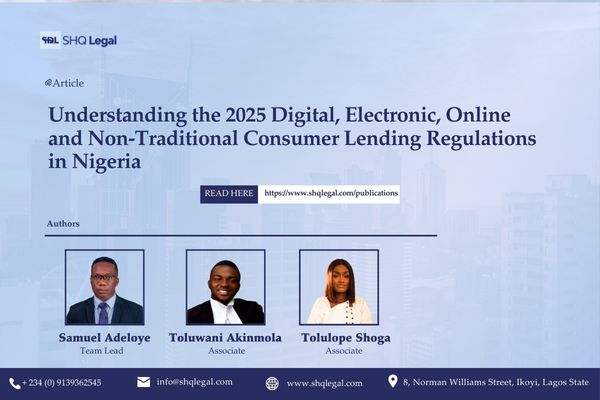Understanding the 2025 Digital, Electronic, Online and Non-Traditional Consumer Lending Regulations in Nigeria
Introduction
Nigeria’s credit market has transformed significantly over the last decade. The rise of mobile applications, fintech-driven lending models, and digital banks has enabled millions of Nigerians to access credit outside of the traditional banking system. While this innovation has deepened financial inclusion and provided quick access to much-needed funds, it has also created a number of systemic and consumer risks. These include exorbitant interest rates, non-transparent charges, high default rates, unlawful debt recovery practices, weak data protection, and the proliferation of unlicensed operators.
To address these challenges, the Federal Competition and Consumer Protection Commission (the “Commission”) introduced the Digital, Electronic, Online or Non-Traditional Consumer Lending Regulations 2025 (“the Regulations”). The Regulations mark the first comprehensive attempt to harmonise the fragmented legal framework that previously governed consumer lending in Nigeria, particularly in the digital space. In doing so, they seek to provide clarity, ensure fairness, protect consumers, and bring stability to the wider financial system.
The Regulations build on the 2022 Limited Interim Regulatory/Registration Framework and Guidelines but now represent a full, binding framework that came into effect on 24th July 2025. They were issued pursuant to the Federal Competition and Consumer Protection Act, 2018, which empowers the Commission to promote competition, prevent market distortions, and protect consumers.
Applicability and Scope
The Regulations apply broadly to all forms of unsecured consumer lending carried out through digital, electronic, online, or non-traditional channels. This includes cash loans, credit in the form of airtime, mobile data, cashback, services, or barter, provided they involve a specific or verifiable monetary value. The rules extend not only to lenders but also to vendors, service providers, partners, and collaborators that derive revenue or benefit from lending activities. Importantly, the Regulations apply to undertakings conducting business in Nigeria whether physically or digitally, even if their operations cut across state boundaries or regulated sectors. In such cases, approvals under these Regulations operate concurrently with sector-specific licences, without prejudice to existing oversight.
Approval and Registration
All undertakings engaged in consumer lending must obtain the Commission’s approval within ninety (90) days of the commencement of the Regulations. Partnerships, joint ventures, and fee-sharing arrangements are valid only if formalised through contracts submitted to and expressly approved by the Commission. Applicants must provide incorporation documents, shareholder and director details, standard terms of service, audited accounts, financial capacity evidence, and sector regulator licences (where applicable). Approvals expire on 31st of December of the third calendar year after issuance and must be renewed by 31st of March of the following year, with subsequent renewals every 36 months.
Furthermore, consumer protection is at the heart of the new framework. Lenders are now expressly required to provide borrowers with clear and simple information about the total cost of borrowing, including clearly spelt out interest rates, fees, penalties, and repayment schedules. Consumer Lending Contracts/Agreement must be presented in language that is easily understood, and all material terms must be disclosed upfront. It is clear that the Regulations aim at eliminating hidden fees and charges that had prior to the introduction of the Regulations plagued the lending contracts and agreements.
Since digital lending depends heavily on the collection and use of data, the Regulations also emphasize the importance of data privacy and cybersecurity. Lenders are required to comply strictly with the provisions of the Nigeria Data Protection Act 2023, which means obtaining informed and express consent from Data Subjects (in this instance consumers or customers) before collecting, processing, or sharing personal data, and ensuring that such data is stored securely. The Regulations also mandate robust cybersecurity systems to prevent Data breaches and unauthorised access. In practical terms, this provision tackles long-standing concerns about borrower information being misused or leaked, and it aligns Nigeria’s consumer credit practices with global standards of data governance
Consumer Protection and Competition Oversight
Beyond disclosures and fair treatment, the Regulations prohibit unfair contract terms, deceptive advertising, or coercive recovery methods. They also embed competition safeguards: lenders providing airtime or data credit must have at least two intermediaries (one of which must be wholly Nigerian-owned), exclusivity arrangements are restricted, and undertakings with market dominance cannot enter consumer lending partnerships without FCCPC approval. These provisions aim to foster transparency, inclusivity, and a level playing field.
Reporting Obligations
Lenders must keep proper records and file annual returns by 31st of March, including transaction volumes, values, complaints, and audited statements. Biannual reports are also required, and data must be shared with credit bureaus. All records must be retained for five years and made available to the FCCPC within 48 hours of request.
Implications for Money Lending in Nigeria
For money lending operators, the Regulations signals a decisive shift from the previously informal and loosely regulated practices to a more structured framework anchored on strict regulatory oversight. .While the argument might be that this regime, might raise the cost of compliance, the positive aspect is that the Regulation also provides a framework for sustainability and growth for serious players who are willing to adapt. Over time, the Regulation will help to eliminate predatory and short-lived operators while rewarding lenders who adhere to best practices. For borrowers, this translates to greater confidence in dealing with licensed lenders and reduced exposure to abusive practices.
Impact on the Banking Sector
For the banking industry, the Regulation levels the competitive landscape. In the past, banks were disadvantaged by stricter regulatory standards, while unregulated loan apps operated with relative freedom. By bringing digital lenders under the same supervisory net, the FCCPC has reduced regulatory arbitrage and created a fairer environment as well as a level playing field for all entities identified as lenders. Banks may now find opportunities to collaborate with compliant fintech lenders, extending consumer and small business credit through innovative platforms while still maintaining prudent risk controls. Furthermore, the mandatory use of credit reporting systems enhances banks’ own risk assessment processes, contributing to better loan portfolio quality across the sector.
Wider Sectoral Impact
Although targeted primarily at lending, the Regulations will also have important implications for other sectors of the Nigerian economy. Technology and telecommunications providers will be directly affected, as secure digital platforms and mobile networks form the infrastructure through which loans are delivered. By mandating stronger cybersecurity and data protection practices, the Regulations indirectly raise the operating standards for software developers, mobile app providers, and telecom operators who facilitate these transactions.
Credit bureaus and data analytics companies are also likely to benefit. With integration now mandatory, demand for reliable credit scoring, identity verification, and consumer risk analytics will expand. This not only strengthens the formal credit infrastructure but also creates opportunities for new service providers specialising in digital risk assessment.
The legal, compliance, and advisory services sector will also experience increased activity. As the regulatory landscape becomes more complex, fintechs, banks, and investors will require ongoing legal support to interpret the Regulations, obtain licences, design compliance frameworks, and handle disputes. For law firms and consultants, this represents a significant area of new opportunity.
Insurance and risk management industries are another indirect beneficiary. With lenders paying closer attention to default risks, there will be greater demand for credit life insurance and loan protection products, which can safeguard both borrowers and lenders.
In addition, the Regulations affect the e-commerce and consumer goods sectors. The growing “buy now, pay later” model, widely used by online retailers and electronic goods merchants, will fall within the scope of the new rules. E-commerce platforms offering credit-based purchases will either need to partner with licensed lenders or obtain their own licences, ensuring that consumer protection principles extend into online retail transactions.
Finally, investment and venture capital activity is expected to increase. The presence of a clear and predictable regulatory framework reduces investor risk and makes Nigeria’s digital credit market more attractive for both local and foreign capital. Civil society and consumer advocacy groups may also play a stronger role in monitoring compliance and educating the public, further improving accountability and trust in the system.
Economic Implications
At the broader economic level, the Regulations are likely to stimulate a more resilient credit market. By curbing reckless lending, enforcing transparency, and protecting consumers, the framework supports financial stability and reduces the risk of widespread defaults that could destabilise the economy. It also promotes financial inclusion by encouraging responsible access to credit for individuals and small enterprises who may have been excluded from the traditional banking system. Importantly, by setting clear and predictable rules, the Regulations improve Nigeria’s attractiveness to investors in the fintech and digital lending space, both locally and internationally. Over time, this can contribute to capital inflows, innovation, and job creation in the financial technology ecosystem.
Conclusion
The Digital, Electronic, Online or Non-Traditional Consumer Lending Regulations 2025 represent a significant milestone in Nigeria’s financial regulatory evolution. They reflect a conscious attempt by the FCCPC to strike a balance between innovation and stability, ensuring that digital lending continues to grow without compromising consumer rights or the integrity of the financial system. For lenders, the Regulations signal the end of an era of light regulation and regulatory gap and the beginning of a regime where compliance, governance, and transparency will determine survival. For consumers, the Regulations promise a safer and fairer credit marketplace. For adjacent industries, from technology and telecoms to e-commerce, insurance, and investment, they create new opportunities and responsibilities, for the Nigerian economy as a whole, the Regulations lay the foundation for deeper inclusion, stronger investor confidence, and more sustainable credit growth. For the Nigerian economy as a whole, the Regulations lay the foundation for deeper inclusion, stronger investor confidence, and more sustainable credit growth.
References in the Article
- Primary Regulation
- Digital, Electronic, Online or Non-Traditional Consumer Lending Regulations 2025, issued by the Federal Competition and Consumer Protection Commission (FCCPC).
- Previous Frameworks & Guidelines
- Limited Interim Regulatory/Registration Framework and Guidelines for Digital Lending 2022, FCCPC.
- Guidelines for Digital, Online, and Non-Traditional Lending 2022, FCCPC (where referenced as an extension of the interim framework).
- Parent Act / Empowering Legislation
- Federal Competition and Consumer Protection Act 2018 (FCCPA) – particularly Section 124 (on consumer protection principles and competition oversight).
- Data Protection
- Nigeria Data Protection Act 2023 – especially Sections 24–28 on lawful processing and prohibition of unauthorised disclosure.
- Regulation 21 of the Digital, Electronic, Online or Non-Traditional Consumer Lending Regulations 2025 (on data protection and cybersecurity).
- Consumer Protection Requirements
- Regulation 17 of the Digital, Electronic, Online or Non-Traditional Consumer Lending Regulations 2025 (on borrower information disclosure).
- Regulation 25 of the Digital, Electronic, Online or Non-Traditional Consumer Lending Regulations 2025 (on credit reporting and banking impact).
- Communications & Tech Infrastructure
- Nigerian Communications Commission (NCC) Act 2003.
- CBN–NCC collaborations on mobile money frameworks (cross-sector oversight).
- Credit Infrastructure
- Credit Reporting Act 2017.
- Corporate & Governance Obligations
- Companies and Allied Matters Act (CAMA) 2020.



.png)
.png)







